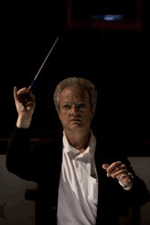> [Archived] Interviews

Happy Birthday to the Conductor and Pianist Vlad Conta!
Happy
birthday, Mr. Conta! Today is an important day in your life, a day
which I believe marks a debut, but also several significant memories.
What influenced you throughout your career? What were the
opportunities you have had in this career as a conductor, which is an
extremely demanding, but also a deeply satisfying one?
Rather than anything else, today is a chronological landmark for me and I do not think it is of much interest. If we must mention it, then I am, indeed, a little bit surprised by the almost fifty years of continuity in this profession, one which is very close to my heart and which has been both a fortunate occurrence and a blessing in my life. It is difficult for me to realise the fact that I have already conducted roughly 500 spectacles at the Romanian National Opera alone.
You
made your debut as a brilliant pianist, coming into contact with an
orchestra for the first time at the age of 13. Then, you decided to
become a maestro, in the sense of coordinating several of your
colleagues. What do you think of this transition, from pianist to
conductor?
It was a natural and necessary transition for me. My dissatisfaction laid with the instrument I was playing, whichproduced sounds in an artificial manner and was unable to sustain a legato. Hence, I felt the need to make music with other people who produced sounds in a different manner. Years have passed since then and they say that the maturity and value of a conductor are revealed when he or she reaches the age of sixty and I have now reached that point in my life. Naturally, the challenges I meet now are different from those of a young musician, but no less interesting. I think that they are part of the same process which started a long time ago. For me, this is an ongoing, uninterrupted vocational process. It is a path towards knowledge, self-knowledge and refinement.
It
seems that nowadays two of the most important requirements in any
artist, in any musician, are versatility and flexibility. Are these
components present in your career?
Yes, they are. But, in my opinion, a professional musician is meant to convey, to interpret, to be the interface, the messenger between the musical creation and the ones who cannot perceive it directly, due to having no training in this field. Of course that the requirements of the market, so to speak, can lead us into directions in which communication has grown more important that ever before. Depending on the occasion, one might adapt with more or less ease to these requirements.
I
believe that one of the mottos that would drive a career in
conducting might be “By giving, you shall receive!” That is, by
sharing your knowledge, you will obtain an ability to communicate in
a certain way and more.
I like to believe that I’m led by the motto “Know how to do it, in order to make it known, renowned and understood.” I think that is the only way a conductor, or any other artist, can fulfill his or her mission in life.
Do
you have any special project in mind which might be very dear to you
and that you would like to achieve?
Oh, there are a lot of projects that I would like to carry out. My work follows a natural path, it is centered mainly on what I currently do, on the productions at the Romanian National Opera, which has some interesting future projects. Aside from those, there are some symphonic programmes to be performed with several orchestras with which I have been working for a long time. I will not tell you about a particular project, because each one of them is important to me and I see no point in singling them out.
Dear
Mr. Conta, we wish you a happy birthday and may you accomplish all of
your projects!
Thank you very much.
Translated by Diana-Crezante Raicev and Elena Daniela Radu
MTTLC, The University of Bucharest














